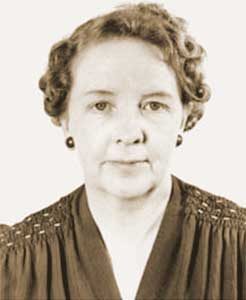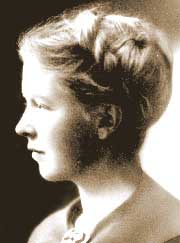
Special Collection
University of Nevada Las Vegas
HAZEL BAKER DENTON
The information below has been compiled from a variety of sources. If the reader has access to information that can be documented and that will correct or add to this woman’s biographical information, please contact the Nevada Women’s History Project.
At A Glance:
Born: June 25, 1887
Died: January 30, 1962
Maiden Name: Baker
Race/Nationality/Ethnic Background: Caucasian
(English, Danish, French, Scotch)
Married: Floyd Howard Denton
Children: Four (two daughters, both died in infancy; two sons)
Primary City and County of Residence and Work:
Caliente (Lincoln)
Major Fields of Work: Education (teacher, elected local school board member), State Government (elected member, Nevada State Assembly), Journalism, Literature (author/poet), Women’s Clubs (Business and Professional Women, Nevada Federation of Women’s Clubs)
Other Role Identities: Wife, Mother, Civic Worker
Hazel Baker Denton was born in Monroe, Utah on June 25, 1887. The following is drawn from Hazel’s own sketch of her family and early life which she prepared in 1955 at the request of the publisher of her book, Ironing Day.
Hazel was the tenth and last child of Utah Pioneer parents, William George Baker and Nicoline Marie Bertelson-Baker (French, Scotch, and English blood through her father; Danish through her Mother.)
The French child who grew up to become her great-grandmother was an infant during the time of the French Revolution. Her parents, who lived in Paris, France, were on the “wrong side of the fence,” and were sacrificed during the Reign of Terror. Her great grandmother was saved by a faithful servant who placed the baby girl in a wine casque and managed an escape with her across the Channel to England. The little girl grew up in England under the protection of her benefactor and moved later to Scotland where she married a Scot whose last name was Griffiths.
One of her daughters, Jean Rio Griffiths, who became Hazel’s grandmother, left Scotland to live in England with the English gentleman she had married, Henry Baker. One of their children was William G. Baker, later to be Hazel’s father. When Henry Baker died in London, Jean Rio Griffiths-Baker became a convert to the Mormon Church. She kept a day-to-day diary of her journey to Salt Lake City from the day she left her London home (“near St. Paul’s Cathedral,” my father used to tell me) on January 4, 1851 until she reached Salt Lake City in September of that year.
She remained in Utah for eighteen years, then moved to San Francisco, California, where four of her sons had preceded her. Her last Journal entry is dated August, 1875.
Hazel wrote that her mother’s parents were also converted to the L.D.S. religion. They sent their children to Utah from Aalborg, Denmark, before arriving themselves. According to Hazel,
“My mother was sent alone when she was seven. The friends who brought her to America left her at St. Louis, Missouri with a nice family who employed her as nurse-maid, taught her to speak, read, and write English, and paid her a small wage, out of which she saved enough in two years to pay her fare on the river boat up to Council Bluffs, Iowa. From there she walked most of the way to Utah beside the covered wagon trains.
“I grew up in Richfield, Utah, where I was in school until I was sixteen. Mother opened a little Millinery Shop after father died in 1902. I still love hats! My sister and I always had the most and the prettiest hats in the village. Mother never measured ribbon or lace or counted flowers when she trimmed hats for us.
“In 1903 (at age 16) I was appointed assistant teacher in an over-crowded first grade. I had always had a little-girl dream of being a school teacher. The experience of those two years as an assistant helped me later to get my State Certificate to teach in Utah.
“Mother died in 1905. All my brothers and sisters were married. I went to Ogden, Utah, to live with brother Ralph and family and to finish High School with additional courses completed at the University of Utah.
“My certified teaching career began in Richfield in 1907 at $50 per month. During the year another young teacher and I began to have some grand ideas about spending our summer in Europe. We figured to borrow money from the local bank to add to what we had saved, if you can imagine saving anything on $50 a month? We did, and we borrowed, and we went to Europe. Taught four more years in Utah to pay it back.
“In 1914, one of my brothers, Nelson, and family were living at a new ‘boom’ mine, the Prince, over the mountains west of Pioche, Nevada. I was offered the school there, a one teacher, all grades deal, at $85 a month. It looked a million to me. In the spring of 1916, I was told by the State Superintendent there was to be a vacancy in the First and Second Grade in Caliente next year; hoped I would apply for it. I did so and arrived in Caliente in September from my vacation in Utah. Was now to get the magnificent sum of $100 a month.”
Hazel Baker was married at Caliente on December 28, 1916 to Floyd Howard Denton, a native of Nebraska. She continued teaching until the first of four children was born in October, 1917, followed by three others in 1919, 1923, and 1925. However, she and her husband “became intimate with sorrow in the loss of two lovely little girls – Henrietta Marie at two years, Betty Jeanne at three.”
In 1922 Hazel was elected a member of the Lincoln County Board of Education and in 1928 she resumed teaching in Caliente with the unusual distinction of being both a teacher and President of the Board of Education at that time. Again, from Hazel’s writings:
“My husband’s business suffered reverses in ’29 and the early ’30s, which gave us a few years of wondering where the next dollar would come from. It was during that time that we considered selling our home and moving to some other location. It was while we were trying to make up our minds about it that I wrote my first poem, ‘Not For Sale.’ We didn’t sell. Later F.H. (the best man that ever lived) found employment with the State, and I went back to the schoolroom.
“Along with teaching, homemaking, and housekeeping, I found myself becoming interested – and enmeshed – in public affairs: town, county, and State-wise. Between times I took a correspondence in Creative Writing, took summer trips in the current car we happened to have paid for, sewed, gardened, and of course – ironed the weekly wash. Both our sons served in World War II. We lost our F.H. (the Papa Bear) in 1951. I retired from public teaching in 1952.”
Hazel’s interest in community can be traced back to her years of teaching at the Prince Mine, when she also conducted a night class for foreign adults to help some of the miners learn the English language. She was President of the Caliente Home Makers Club in 1921-22, and was President of the Caliente Parent-Teachers Association in 1926-28, adding the job of librarian of the Caliente PTA Library with its inception in 1928.
Hazel Denton was one of the few Nevada women profiled in a 1935 history by James A. Scrugham, Nevada: A Narrative of the Conquest of a Frontier Land. Scrugham described Hazel as “an unusually well read and informed woman in the field of politics and economics, and like so many students of world affairs in these days, she is inclined to liberal, internationalistic and socialistic views.”

Courtesy Ralph Denton
Always active in education, she was President of the Lincoln County Classroom Teachers in 1948-49 and Treasurer of the Nevada State Classroom Teachers during the same years.
In 1952 Hazel Denton was elected as a Democrat to the Nevada Assembly and was re-elected in 1954. Maude Frazier, a Democrat from Clark County, also served during those same years and Republican Mabel Isbell of Washoe County joined them in the Assembly for the 1955 Session. While in the Assembly, Denton introduced several bills and resolutions aimed at improving the status of free public libraries and state parks.
Hazel’s journalistic and literary leanings began in 1937 with a regular column in the Caliente newspaper; it was signed JMR in memory of her grandmother, Jean Marie Rio. Another regular feature in the paper by Hazel was “While the Toast Burns,” carried in 1951-52.
Both poems and paragraphs from these years of writing were included in her book, Ironing Day, published in 1955 by Exposition Press of New York. The book’s cover indicated: “Although she is a teacher, clubwoman, newspaper columnist, and member of the Nevada Legislature, Hazel Baker Denton classifies herself as a housewife who does her own ironing. It’s while ironing, she says, that most of the ideas for her poems and essays run through her head – hence, the title Ironing Day.”
Hazel Denton died in Las Vegas on January 30, 1962. Services were held in Caliente with Bishop Wesley Holt of the Church of Jesus Christ of Latter Day Saints officiating. Governor Grant Sawyer delivered the eulogy, and burial was in the Caliente cemetery.
Biographical sketch by Jean Ford
Published Works:
- Denton, Hazel. Ironing Day. New York: Exposition Press, 1955.
Sources of Information:
- Hazel Denton papers, 1887-1957, Special Collections, University of Nevada, Las Vegas. Obituary, Reno Evening Gazette, February 1, 1962.
- Scrugham, James A. Nevada: A Narrative of the Conquest of the Frontier Land. American Historical Society, 1935.
- Vincent, Bill. “The Dentons and Lincoln County,” Nevadan, May 1, 1977.
